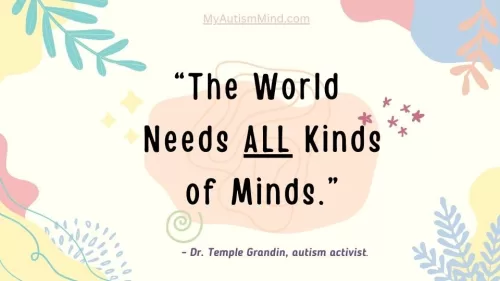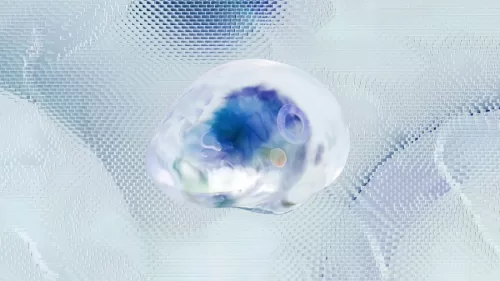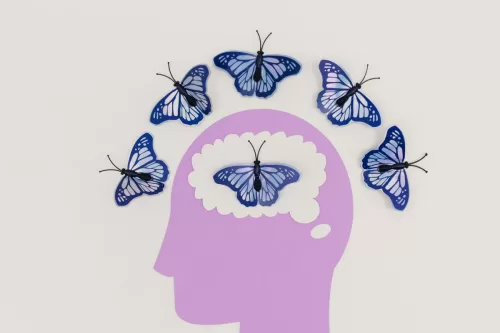Thinking Differently: Why Having Brains on Fire Sparks Innovation
 Neurodiversity is sometimes considered a strength because it allows people who think differently than the norm to step outside of the box and come up with unique solutions to problems. It’s part of the more positive neurodiversity paradigm, which sees conditions like autism as valuable forms of differences that should be supported.
Neurodiversity is sometimes considered a strength because it allows people who think differently than the norm to step outside of the box and come up with unique solutions to problems. It’s part of the more positive neurodiversity paradigm, which sees conditions like autism as valuable forms of differences that should be supported.
Thinking differently, whether it’s due to autism spectrum disorder (ASD), ADHD, or a host of developmental disorders, is increasingly being thought of as a competitive advantage in the right environment, because it can capitalize on strengths rather than trying “fix” someone or working to overcome challenges. In a nutshell, neurodiverse individuals can offer new ways to look at the world and thus new ways to solve problems that neurotypical people just can’t see.
This idea was inspired by Dr. Temple Grandin, a pioneering advocate for autism awareness and neurodiversity.
Her powerful quote, “The world needs all kinds of minds,” gets to the heart of why neurodiversity is so important. For too long, neurological differences like autism have been viewed through a deficit lens; something to be “cured” or “fixed.” But the neurodiversity paradigm shift views conditions like autism not as mere disorders, but as naturally occurring cognitive variations.
Just as we aim to protect biodiversity in nature, we must protect neurodiversity for the vitality of our collective human mind.
The Neurodiversity Paradigm and Thinking Differently
The neurodiversity paradigm movement challenges the predominant medical model that sees neurological differences as conditions often requiring treatment and prevention. Instead, it reconceptualizes conditions like autism, ADHD, and dyslexia as part of the natural variations in human neurocognition, not tragic deficits inherent to the human mind.
While neurodiverse individuals may face disabling societal barriers and challenges like social communication difficulties, the neurodiversity view reframes these “deficits” more neutrally as differences in how the brain processes information and interacts with the world. From this perspective, what is disordered is society’s inability to accommodate divergent ways of thinking and experiencing reality.
Essentially, the neurodiversity paradigm view doesn’t seek to cure or eliminate forms of neurodivergence. Rather, it aims to normalize them as valid paths in the continuous variation of humanity’s neurocognitive evolution – each naturally selected diversity having its own unique strengths and adaptive advantages.
READ MORE: Autism on the Brain and Packing the Meaning Behind Neurodiversity
The Gifts of All Kinds of Minds
In our systematically neurotypical world, the cognitive strengths that come with all kinds of minds are often overlooked or undervalued. Yet many experts in fields as diverse as animal welfare, technology, and pure mathematics have leveraged their uniquely autistic minds to achieve breakthroughs.
Temple Grandin’s pioneering work on humane livestock handling practices was driven by her ability to think like the animals quite literally—processing reality through a heightened visual and sensory lens. Advances in fields from software engineering to video game design have been catalyzed by thinking differently and with it the intense pattern recognition, attention to detail, and systems-based thinking associated with many autistic cognitive styles.
Even beyond concrete professional contributions, neurodiverse thinkers representing all kinds of minds enrich our collective perspective of the world.
Autism researcher and autistic Michelle Dawson asserts that instead of fixating on minimizing autistic differences, we should see them as beneficial cognitive variations akin to biodiversity. “We need to cultivate autistic humans’ cooperation and mutual understanding, by respecting and nurturing–not neglecting, stigmatizing and impairing their autistic human potential.”
The Case for Neurodiversity and Needing All Kinds of Minds
It could be argued that protecting biodiversity and preventing mass extinctions is not only an ethical obligation, but also essential to the survival of our species and planet. After all, each organism plays an integral role in the resilience and vitality of ecosystems on which all life depends.
In the same vein, fostering a neurodiverse human civilization—one that doesn’t force conformity to a single neurotype—is both a moral and practical imperative. The ability to think differently, despite its disadvantages in a world engineered for one dominant cognitive phenotype, points to its adaptive value for resolving critical challenges.
 Climate change, sustainable development, technological risks—none of these “wicked” problems will be solved through singular neurotypical thoughts alone. We need the vital range of all kinds of minds working in tandem and harmony to architect a collective human response that secures our future.
Climate change, sustainable development, technological risks—none of these “wicked” problems will be solved through singular neurotypical thoughts alone. We need the vital range of all kinds of minds working in tandem and harmony to architect a collective human response that secures our future.
In her latest book Divergent Mind, Grandin asserts: “My mind allowed me to translate the autistic view into the ‘anthropologists’ of the human experience. More “Windows” into the human experience, not fewer, are needed to deal with present environmental, technological, and ethical challenges.”
Of course, there are significant difficulties and challenges that come with being on the autism spectrum. Developmental delays, sensory issues, and struggles with communication, socialization, and independent living remain very real and disabling conditions. Suicide rates among autistic youth and adults remain tragically high and is in dire need of being addressed.
But rather than framing autism itself as something to be eliminated, the neurodiversity movement advocates creating a more accommodating world where those with cognitive differences can thrive. Access to early intervention, therapies, special education, workplace accommodations, and supportive communities is critical.
Many of the current struggles autistic people face are due to intolerance and lack of support rather than autism itself and how they think differently, and that’s why those traditional beliefs about autism need to be challenged.
READ MORE: History of Autism – Revealing Shocking Mysteries from the Past
Unlocking Innovation Through Thinking Differently
Beyond being an ethical imperative, embracing neurodiversity can be a powerful driver of innovation and creative problem-solving across sectors. Many of humanity’s greatest breakthroughs and works of genius have emerged from neurodiverse minds.
Take the field of mathematics, for instance. Some researchers estimate that as much as 30% of those making important contributions displayed traits associated with autism spectrum conditions. Many pioneering thinkers are believed to have been on the spectrum, allowing them to make conceptual leaps and see patterns invisible to neurotypical mathematicians.
In the arts, figures as varied as Michelangelo, Lewis Carroll, Andy Warhol, and Greta Gerwig have been speculated to have had autistic or neurodivergent traits. Their unique perceptions and hyperfocus enabled profoundly original creative visions that shaped entire artistic movements.
Then there are the technological and entrepreneurial realms, where neurodivergent individuals have become highly sought after for their systematic mindset and ability to think differently about complex systems. Many leaders in Silicon Valley, from prominent programmers to tech magnates, are believed to be on the autism spectrum.
A growing number of companies have launched neurodiversity hiring and employment initiatives, not just out of a sense of corporate social responsibility, but because cultivating this cognitive diversity of autistic thoughts drives tangible innovation. Some companies, especially technology-focused ones, explicitly recruit individuals on the spectrum for their strengths in areas like pattern recognition, logical reasoning, and sustained concentration.
The United Nations has taken note as well. In 2019, it hosted the World Innovation Summit on the role of autistic talent in achieving sustainable development goals—underscoring the need for neurodiverse perspectives on solving humanity’s greatest challenges around climate change, poverty, healthcare, and more.
Think Differently: Optimizing a Neurodiverse Civilization
 Of course, maximizing the creative benefits of neurodiversity will require systemic changes to make environments more universally accommodating and accessible for all cognitive styles. Too often, conventional spaces and social structures exclude participation from those with sensory issues, communication differences, and other neurological needs.
Of course, maximizing the creative benefits of neurodiversity will require systemic changes to make environments more universally accommodating and accessible for all cognitive styles. Too often, conventional spaces and social structures exclude participation from those with sensory issues, communication differences, and other neurological needs.
Already, advances in technology and inclusive design are pointing the way towards more neurodiversity-optimized spaces, tools, education systems, and workplaces. Universal design principles centered on flexibility, simplicity, and alternatives for interaction can make physical and virtual environments more navigable for neurominorities.
In the classroom, equipping teachers with training on universal design learning principles like presenting content in multiple formats and allowing flexible means of engagement can open up learning for neurodiverse students. Employing assistive technologies like augmented/virtual reality, text-to-speech, voice interfaces, and more offers alternative pathways to accessing information.
READ MORE: Autism and AI – 7 Exciting Examples of Artificial Intelligence Support
Many firms are reconfiguring office spaces and workflows to be “autism/ADHD-friendly” – minimizing overwhelming stimuli while maximizing opportunities for hyper-focus and special areas of interest. Cloud computing, remote work, and self-paced productivity can be boons for neurodivergent individuals who thrive in non-traditional environments.
More broadly, developing a culture of mutual understanding and appreciation for cognitive differences will be key. Accessible, science-based neurodiversity training for teachers, employers, and community members can foster support systems that bring out the abilities and strengths in all neurotypes. Reciprocal mentoring programs pair neurominorities with sustained advocates who champion their talents.
Just as modern societies have evolved to accommodate different physical abilities and identities, humanity must now evolve to embrace the full spectrum of neurocognitive variations and autistic thoughts. Our collective future may depend on it.
The journey towards a truly neurodiversity-embracing world is still in its early stages. There is still much education, inclusion work, and systemic change ahead to reach the ideal of a society optimized for all types of brilliant, uniquely wired minds.
But the momentum seems increasingly unstoppable, driven by the self-advocates, researchers, employers, and others experiencing firsthand the vast innovative potential in cultivating cognitive pluralism. A unified neurodiversity paradigm is coalescing – one that simultaneously uplifts neurominorities while harnessing their strengths for the greater good.
READ MORE: Autism in the Future – Optimism for Improved Perception and Embracement
Moving Toward Embracing Neurodiversity and Autistic Thoughts
 While the neurodiversity perspective has faced backlash from sectors of the medical establishment and parent groups who fear it downplays the immense hardships many with autism face, the movement continues gaining momentum.
While the neurodiversity perspective has faced backlash from sectors of the medical establishment and parent groups who fear it downplays the immense hardships many with autism face, the movement continues gaining momentum.
Technology companies like Microsoft, SAP, and Dell have launched neurodiversity hiring programs to recruit talent from this underutilized pool. College programs are training the next generation of neurodivergent scientists, engineers, and entrepreneurs to thrive. Some cities like Brisbane are officially declaring themselves “neurodiversity hubs” to attract this creative capital.
Even mainstream entertainment has brought more diverse autistic thoughts to the forefront. Shows like The Good Doctor and Atypical aim to destigmatize and humanize autistic experiences, while books like Born on a Blue Day and The Reason I Jump provide vital autistic perspectives.
Ultimately, embracing neurodiversity is about creating an inclusive society where all humans – in all our neurocognitive diversity – have the freedom and support to pursue lives of dignity, fulfillment, and self-actualization. As we strive to transition to a more sustainable human civilization, we’ll need every kind of brilliant, neurodiverse mind playing its part.
Embracing neurodiversity and celebrating thinking differently and other cognitive differences isn’t just the ethical path forward. It’s key to solving humanity’s toughest challenges and unlocking our species’ boundless innovative potential. Let’s build a future that makes room for all kinds of minds to flourish.
READ MORE: Help Achieve Autism Acceptance Through Positive Engagement
Autism in Adults: Living, Learning, and Overcoming Challenges for a Fulfilled Life
Autism in adults requires additional support and coping skills to achieve independence in today’s world.
Learn more about ways adults can live fulfilled lives and the challenges they face.
- 14 Practical Ways for Staying Motivated to Unlock Full Potential
- Autism and Independence: 7 Skills That Empower Individuals to Thrive
- Dangers of Social Media Addiction: How To Leave the Screens And Face the Real World
- Autism Volunteer Opportunities: 5 Ways Helping Others Fosters Acceptance
- 8 Heartfelt Ways Autism Emotional Support Animals Transform Lives
- Top 25 Hurdles Individuals Face Daily on the Spectrum
- Are You An Adult With Autism? Here Are 6 Signs
- Autism After High School: Is College the Next Step?
- Autism vs Asperger’s Syndrome: What You Need to Know
- Autism Disclosure: Is Revealing Your Disorder Helpful or Hurtful?
- Work and Autism: What Employers Should Know About Hiring People with Neurodiversity
- Drivers with Autism Can Achieve Success Behind the Wheel